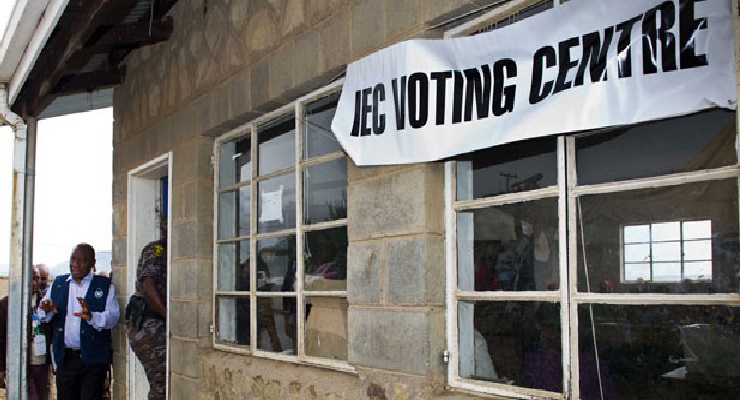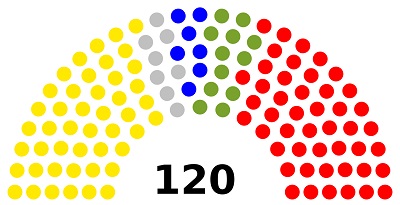
The Basotho people went to the polls over the weekend quietly, calmly and without incident serve for the unwelcome presence of the army at polling station and on the streets across the country. Reports say the army said it was in full force to help the Independent Electoral Commission (IEC) who strongly refuted any invitation of the army to the polls.
Lesotho’s snap general elections were historic in that more voters turned out that any previous election. However, the race to form a new government is obviously pitting once allies against each other, former Prime Minister Thomas Thabane leader of the All Basotho Convention (ABC) and Prime Minister Pakalitha Mosisili of the Democratic Alliance (DC). These two were once members of the Lesotho Congress of Democracy (LCD) for years before exiting to form their own parties.
In the 2015 snap general election, Thabane’s ABC came second with 46 seats. Pakalitha Mosisili’s DC was narrowly ahead with one shabby seat (47) and formed a majority of at least 61 with other six smaller parties that eventually played a leading role in instituting a no confidence vote against Prime Minister Mosisili three months ago.
Who is Thomas Thabane?
Thomas Thabane was a member of the government of Prime Minister Pakalitha Mosisili from 1998-2006 during their heir days at the Lesotho Congress for Democracy (LCD) party. He became Prime Minister of Lesotho (2012-2015) has lead of ABC and a coalition of 12 opposition parties. He is the leader of ABC which is part of opposition pact that agreed to support each other’s candidates in selected constituencies and effectively form a coalition government if need arise.
Other parties to the treaty includes Reformed Congress of Lesotho (RCL) led by Keketso Rantso, Monyane Moleleki leading the Alliance of Democrats (AD), Thesele Maseribane in charge of the Basotho National Party (BNP)
Who is Pakalitha Mosisili?
Pakalitha Mossillili is a long time ruler of Lesotho. He ruled Lesotho between 1998-2012 and 2015-June 2017 during his long stint at Lesotho Congress for Democracy (LCD) before coming back under a seven party coalition in 2015 where he was named prime minister. The outgoing prime minister’s party formed an electoral pact with LCD similar to the ABC and other parties where his party and LCD supported each other in selected constituencies. DC over fielded in 54 constituencies, while LDC in 25 constituencies whilst the Popular Front for Democracy (PFD) was supported in one constituency by both DC and LCD.
Who is likely to win election?

Judging with the reports from Lesotho it seems the country is sliding to another hung parliament with Thomas Thabane’s ABC winning the polls but, however, will be short of the 61 seats required to form a government making it likely that another coalition will form government.
By late Sunday Thabane’s ABC party was leading with 26 seats in the 80 directly contested seats. The remaining 40 seats from a total of 120 will be dished out using proportional representation in parliament. 61 seats is the majority required to form government either outright or through a coalition. With the final results expected later Monday 5 June or by end of Tuesday 6 June Lesotho’s crisis will obviously not be solved by this election.
Will Lesotho perennial crisis be over?
In my first article on Lesotho some two weeks ago l articulated that it has been in crisis since independence in 1966. As things stand, the Lesotho crisis will persist mainly because:
- The new government will be formed by either Thabane’s ABC or Mosisili’s DC with the help of smaller parties. These are the same people who over the last two decades have been stumbling, fumbling and groping in the dark without any solution in sight.
- The country urgently requires institutional reforms in the army, police and parliament which neither Thabane nor Mosisili has previously managed to undertake during their respective tenure as Prime Ministers.
- The regional body Southern African Development Community (SADC) will find it increasingly hard to find a common solution to the Lesotho crisis because if Thabane forms government, political analysts believe he will go for a witch hunt for the coup plotters who forced him to seek refuge in South Africa in 2014 when he was Prime Minister Mosisili on the other hand, last month wrote a starching letter to SADC accusing it for direct interference into his country’s internal affairs. A letter that was harshly responded to by Botswana’s President Ian Khama.
In conclusion, South Africa which completely surrounds Lesotho will continue lead efforts to stabilize the mountain kingdom because of its obvious proximate and economic interests. Lesotho produces water for South Africa and any major political polarization may result in massive shortage of water in South Africa which in turn can lead to diseases and social unrest in Africa’s biggest economy. South Africa will not permit chaos more so within their territory. Therefore, South Africa will obviously influence SADC to grant them permission to deal decisively with any threats to its socio-economic fabric like it did in 1998 and 2014 when it had to deploy to restore order in Lesotho.
Leave a Reply